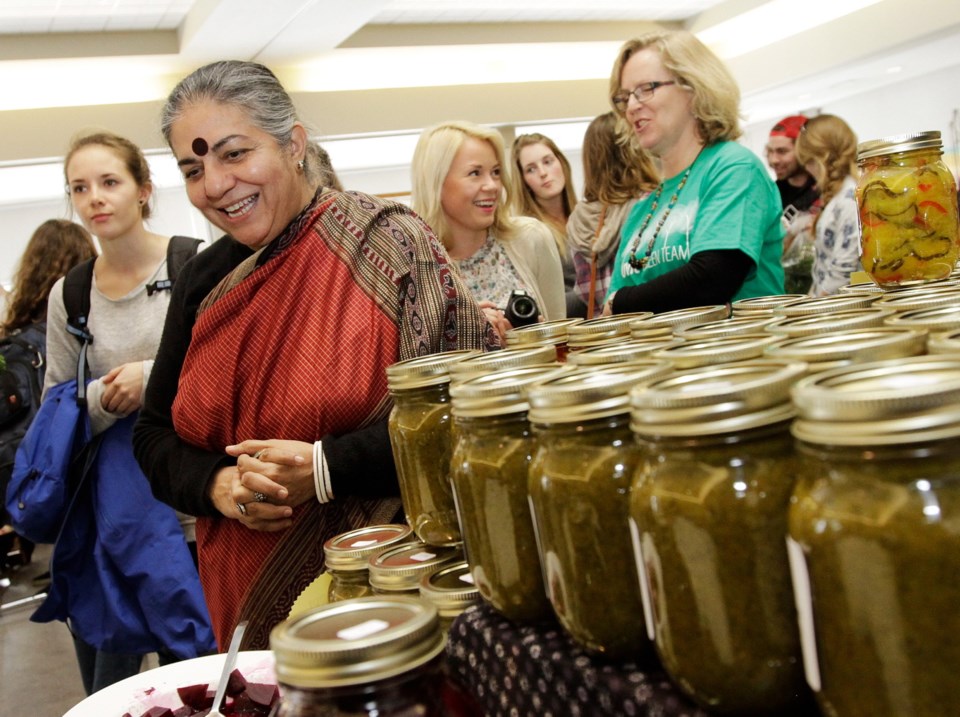You don’t get named an environmental hero by Time magazine or one of the five most powerful communicators in Asia by newsmagazine Asiaweek without picking up a few honorary degrees along the way.
“I have a few, yeah,” Vandana Shiva said in an interview Tuesday, without being able to say how many. “I’d have to count them.”
Shiva, whose home-base is Dehradun — the northern Indian city nestled in the foothills of the Himalayas — is in Victoria to receive an honorary doctor of laws at the University of Victoria. The environmental activist will also give a lecture Wednesday night on the future of food — a topic she considers intimately connected with politics.
“The future of food will be decided by how democracy evolves,” she said.
That evolution is not necessarily moving in the right direction.
The most recent step in an alarming trend, she said, was the quiet passage of a rider dubbed the “Monsanto protection act” by critics this month. The U.S. House of Representatives passed the farmer assurance provision, effective through September, as part of the agricultural appropriations bill. Shiva said the rider protects genetically modified seeds and the corporations that make them from litigation, even in the face of health risks.
“Monsanto has managed to tack onto that law a rider that no court can ever bring them to trial,” Shiva said. “They have immunity. And that, to me, is the ultimate abuse.”
Growing up in India, Shiva saw first-hand the harmful effects of genetically modified foods on farmers and the poor. She has covered the topic in essays and books — of which she’s written more than 20 — including Stolen Harvest: The Hijacking of the Global Food Supply.
But it’s not all doom and gloom. Shiva said she’s seen positive change through Navdanya, the women-centred food- and seed-protection movement she launched in 1987 in India. And in the brief time she has spent at UVic, she has seen it here, giving the example of young students who spread food literacy on campus.
“The community is involved,” she said. “When you see that — that’s another future. That future is based on diversity, it’s based on local, it’s based on participation, it’s based on sustainability and lowering your ecological foodprint, while increasing the health and nutritional benefits of food.”
While it’s still young, she called the food movement the biggest movement of our time. And she said its positive outcomes are well within reach. “It’s not a utopia, it’s not a dream,” she said. “It’s happening here and it’s happening through Navdanya in India.”
An important step in the movement has been recognizing the connection between food and other forces. It’s impossible to talk about food without also considering the environment, social justice, politics and feminism, for example.
“Both my own personal evolution, as well as my intellectual training has been to see connections,” Shiva said. Her doctoral work at the University of Western Ontario in physics focused on “non-locality and non-separability in quantum theory.” She also holds a master’s degree in the philosophy of science from the University of Guelph.
At a recent panel discussion on universities and food security, she advocated for breaking from traditionally narrow expertise and embracing more holistic academic perspectives.
“We’ve got an old model of disconnection,” she said. “That’s what’s working to destroy the food system. You disconnect [food] from the environmental impact, you disconnect it from the health impact, you disconnect the farmer from the eater, you disconnect the soil from the plant and you’re disconnecting at every level.”
Such major problems abound, but she said there are many things Vancouver Islanders can do daily to make a difference.
The first thing is getting to know what you eat. Next is making choices to eat well. And finally, citizens can call on local governments to make laws that favour human health and the environment, ahead of corporate interests.
“We need better options than destroying the planet and our health,” she said.
- - -
Environmental activist Vandana Shiva, in town to accept an honorary degree, speaks Wednesday night at the University of Victoria. The Future of Food begins at 7 p.m. in the University Centre Farquhar Auditorium. Tickets for the event are fully reserved; however, an in-person waiting list will be taken at the UVic Ticket Centre beginning at 6 p.m.



